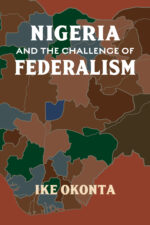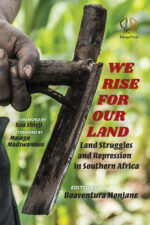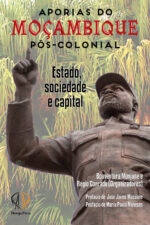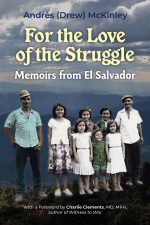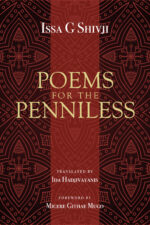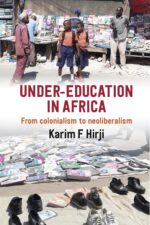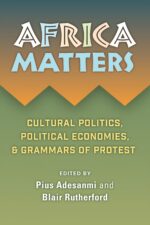-
Nigeria and the Challenge of Federalism
USD $ 5.00 USD $ 14.00Price range: USD $ 5.00 through USD $ 14.00Select options This product has multiple variants. The options may be chosen on the product pageNigeria and the Challenge of Federalism
USD $ 5.00 USD $ 14.00Price range: USD $ 5.00 through USD $ 14.00The book identifies three key moments in Nigeria’s experience with federalism and makes the argument that a complex and socially-diverse country like Nigeria can only be successfully governed by a truly federal arrangement, and not the present unitary contraption that has only delivered poverty, social unrest and the powerful centrifugal forces that are now threatening the very existence of the country itself. The time has come, write Ike Okonta, to convene a conference with sovereign powers to design a federal constitution for the country. The current process of amending the 1999 Constitution by the National Assembly will not suffice. The document is so hopelessly flawed that only its discarding and a fresh effort at constitution-making will suffice.
Select options This product has multiple variants. The options may be chosen on the product page -
Select options This product has multiple variants. The options may be chosen on the product page
Undaunted: Stories of Freedom in a Shackled Society
USD $ 15.00….to free oneself or assist in liberating others involves taking risks, being suspicious of the status quo, leaving the safety of the shore and launching out into the deep and the unknown. This is a very lonely calling too as one immerses oneself into the whole of reality with courage to confront and listen. Yet, the calling is not to be the liberator of the oppressed but to make a commitment to fight alongside them, as Paulo Freire wrote in Pedagogy of the Oppressed. — Fr Gabriel Dolan
From his work in Turkana, Kitale, Kapenguria and Mombasa, Father Gabriel reminds us that true transformative change comes from the people themselves, from the bottom up. This is a challenge that the social justice/human rights practitioners must internalize and the sooner the better. The idea of being the “voice of the voiceless” must transform to facilitating, encouraging and giving space to those who suffer the indignities of injustice, violence, poverty and repression. Indeed, one of the most significant tasks for the human rights community is to devolve away from Nairobi, in real, practical, and substantive ways.
It is not easy for a white man, with all the attendant privileges that brings, to become an integral part of the struggle for pro-poor transformative change in Kenya, and be subject to arrest, harassment, and repression. For those who read these memoirs, please circulate them to everyone you know. Translate them, read them in the mosques, churches and under trees so that Kenyans can get a sense of where we have come from, what we should avoid, and what it takes to make some gains that benefit the majority of our people. — Maina Kiai
Select options This product has multiple variants. The options may be chosen on the product page -
Mau Mau From Within: The Story of the Kenya Land and Freedom Army
USD $ 12.00 USD $ 30.00Price range: USD $ 12.00 through USD $ 30.00Select options This product has multiple variants. The options may be chosen on the product pageMau Mau From Within: The Story of the Kenya Land and Freedom Army
USD $ 12.00 USD $ 30.00Price range: USD $ 12.00 through USD $ 30.00The inside story of the struggles of the Kenya Land and Freedom Army, referred to by British colonialism as the ‘Mau Mau rebellion’, is little known today. The autobiographical material written by Karari Njama (a senior leader in the Mau Mau hierarchy) and compiled by Donald L. Barnett was first published by Monthly Review Press in 1966 as Mau Mau From Within: An Analysis of Kenya’s Peasant Revolt. It was reprinted in 1970; it has remained out of print for many years. As the late Basil Davidson put it in his review of the first edition: “Njama writes of the forest leaders’ efforts to overcome dissension, to evolve effective tactics, to keep discipline, mete out justice … and to teach men how to survive in those merciless forests. His narrative is crowded with excitement. Those who know much of Africa and those who know little will alike find it compulsive reading. Some 10,000 Africans died fighting in those years . Here, in the harsh detail of everyday experience, are the reasons why.”
The book is an extraordinary story of courage, passion, heroism, combined with recounting of colonial terror, brutality and betrayal. It is a story of how the very idea of being ‘Kenyan’ was intimately linked to the idea of freedom, a connection that was destroyed not only by the firepower of the British, but also by those who collaborated and established themselves as the beneficiaries of neocolonial rule. Disconnecting notions of freedom from identity left only a caricature that rapidly descended into tribalism and ethnicity.
This momentous story of the struggle for freedom described here is relevant not only for a new generation of Kenyans but also for all those engaged in emancipatory struggles internationally. For so long as the experiences arising from the struggles described in this book are perceived as merely ‘African’ or ‘Kenyan’, it is not possible to fully grasp the contributions they have made to the struggle for a universalist humanity.
What is recounted in this publication is more than an ‘analysis of a peasant revolt’. It is, above all, a history of the Kenya Land and Freedom Army. As Ngūgī wa Thiong’o points out in his Preface to this new edition, ‘we don’t have to use the vocabulary of the colonial to describe our struggles.’ We were tempted to rename the book ‘Kenya Land and Freedom Army from Within.’ But because the original title has wide recognition, and one of the characteristics of movements of the oppressed is to appropriate derogatory terms
Select options This product has multiple variants. The options may be chosen on the product page -
Transforming ourselves, Transforming the World: An open conspiracy for social change – Second Edition
USD $ 5.00 USD $ 20.00Price range: USD $ 5.00 through USD $ 20.00Select options This product has multiple variants. The options may be chosen on the product pageTransforming ourselves, Transforming the World: An open conspiracy for social change – Second Edition
USD $ 5.00 USD $ 20.00Price range: USD $ 5.00 through USD $ 20.00This book is for all those—community workers, adult educators, social activists of every kind—who want to overcome pessimism and play a part in changing society in the direction of peace, justice and dignity for all human beings. As author Brian Murphy points out, many of us are pessimistic about our ability to change the world when confronted by the powerful forces of big corporations and big government. Murphy reveals the social and personal dilemmas which hold people back from social engagement, and argues that the various constraints we face can be overcome.
In this new edition, David Austin explains in his Introduction why this book, first published in 1999, is perhaps more relevant to our times than ever, offering insights from his own experiences of engaging critically with the book and with others. And in his Afterword, Brian Murphy reflects on the continued relevance of the original text, emphasizing how our humanity is being corroded and commodified. To reclaim our humanity, he argues, we must transform ourselves to transform the world.
Brian Murphy’s immensely inspiring book,Transforming Ourselves, Transforming the World, deeply challenges us to think and rethink everything we knew and thought we knew.—Nnimmo Bassey, Executive Director, Health of Mother Earth Foundation & Right Livelihood Award Laureate in 2010
We need more conversations like the one in this book, which are rooted in hope while honestly working through a foundational way of seeing and understanding ourselves in the bigger picture.— Christina Warner, Co-Executive Director and Director of Campaigns and Organising, Council of Canadians.
This is one of the coolest, enjoyable and important books I have read in recent years. Written from the heart as well as the head, it is a breathtakingly visionary, unique and insightful take on the life of the ultimate activist.—Hope Chigudu, Feminist activist
Select options This product has multiple variants. The options may be chosen on the product page -
Ghostlines – Re-Drawing the LAPSSET Corridor in Kenya
Ghostlines is a graphic novel that describes the journey of the author and three Kenyan artists along the LAPSSET development corridor, a braid of roads, pipelines, and resort cities that promises to bring development to Kenya’s marginalized north. It mixes conceptual and empirical insights into the human geography of infrastructure with the narrative flexibility and depth afforded by the medium graphic novel – a geo-graphic novel.
They meet Peter, a retired pilot who had previously worked for a conservancy and can tell stories about the LAPSSET from high above and from the ground. He understands how everyone involved is seeking to benefit from the corridor in their own way, even if that means building uninhabited “ghost huts” that manifest the presence of pastoral communities and thus qualify them for compensation. Jane is an activist for a women’s and Indigenous rights organization. She’s been fighting invisible monsters her entire life: stalking hyenas (metaphorical and real), corrupt politicians, and the patriarchy itself. The spectre of the LAPSSET is only the last one of these hidden monsters. They meet Joseph, a herder, who hopes that the LAPSSET might connect him to far places but worries that it will instead cut him off of the grazing grounds that are essential for the survival of his family. What is the LAPSSET – a road or a fence? In Oldonyoro they meet Rashid, a poet, who writes about the long history of the corridor. In his mind, it reaches far back to colonial times. “My grandfather suffered greatly,” he writes, “Is it my turn to face the worst? I wonder, a tricky treasure”. In the last village on their journey, they meet a group of women who have come together to support each other. Their position on the LAPSSET is more optimistic. The real connections of solidarity they forged contrast with the imaginary ghostlines of the LAPSSET. The narrative structure of the geo-graphic novel draws connections between the narrators, that is, the team of researchers and artists and the interviewees. They seek to unravel the idea of the omniscient or unbiased narrator and to reveal how storytellers bring their own ghosts into stories. By connecting all of these narratives along their journey, they challenge the single, universalist story that planners tell about large-scale infrastructure projects. Instead, they invite the reader to embrace the often-contradictory multiplicity of infrastructural relations, to see the ostensibly solid lines on maps for what they are: a messy, ever-changing braiding of multitudes.
-
Rooted in struggle
This book is the culmination of several years of partnership between social movements, social justice organizations and academics in Ghana, South Africa, Guatemala and Canada. Called the Translocal Learning Network, this partnership has generated a space for those facing the multiple and overlapping crises of our time to come together and share knowledge and mutually solidarize with each other’s struggles. This knowledge exchange and mutual solidarity has been non-hierarchical and collaborative in nature, and has taken the form of sharing and commenting on complex stories through a participatory research methodology known as narrative restorying. As such, this book will focus on the stories each partner has shared, along with engagement with these stories by other members of the network. This interplay of knowledge sharing will provide a window into the social movement learning of network members.
The central argument of the book was best captured by Thapelo Mohapi in our recent presentation at the Development Studies Association conference at SOAS in London, UK: “It is always assumed that when you are poor, when you are living in a shack, when you live in a rural area, when you are marginalized, that you cannot think for yourself, that you cannot be involved in development, because you are poor”; instead of this “People must make decisions and must be consulted, and they must have a voice to speak about their own development. It must be initiated and completed with the people.” This book is literally a space where those on the front line of struggles against land dispossession, livelihood dispossession, violent resource exploitation, forced marginal living, climate fueled emergencies, and the denigration of cultural and traditional indigenous knowledge share their experiences, learning, successes, and defeats, with those facing similar and related struggles. In addition to these front-line voices, scholars working alongside these struggles, share some of their learnings and ideas that have emerged from the partnership, and these reflections are also brought into dialogue with front-line activists. In other words, this book provides a window into a rich, ongoing dialogue of mutual learning and support that will speak to audiences in the activist and critical academic communities.
To that point, this translocal network uses the notion of translocality to push back on the capitalist, colonial, and neo-liberal agenda of a)maintaining divisions between people struggling against oppression in different parts of the world (through border controls, language divisions, and colonial racialized othering); and, b)maintaining a knowledge hierarchy that states, international institutions, intellectual institutions, and corporations are those best able to contend with the many crises we face, and even within activists, it is those movements and organizations with broad, multinational reach that can best speak for the affected. Translocality rather argues that it is those with local knowledge of crises and context that are best positioned to speak to what needs to change, and that local struggles meeting each other as equals, translocally, is the best way to learn from one another without imposing new forms of knowledge hierarchies. -
Poems for the Penniless
USD $ 5.00 USD $ 18.00Price range: USD $ 5.00 through USD $ 18.00Select options This product has multiple variants. The options may be chosen on the product pagePoems for the Penniless
USD $ 5.00 USD $ 18.00Price range: USD $ 5.00 through USD $ 18.00These poems by Issa Shivji, lawyer, activist and Tanzanian public intellectual, were written at different times in different circumstances. They give vent to personal anguish and political anger. Mostly originally written in Kiswahili, here accompanied by English translations, and they are intensely personal and political.
Poems are clustered under several headings to provide a context. The first combines personal agony at the loss of comrades and friends with poems about love and affection for living ones. The second is about robberies of freedom, resources, and dignity and the loss of justice under neoliberalism. The third section, entitled Hopes and Fears, comprises short poems tweeted over the last five years expressing despair, fear and hope in the human capacity for freedom.
The last section are poems, concerned with Shivji’s period in South Africa in 2018, reflect on the emergence of neo-apartheid with its wanton and shameless exploitation of the majority.
Wonderfully translated by Ida Hadjivayanis.
Select options This product has multiple variants. The options may be chosen on the product page -
Strategic litigation and the struggle for Lesbian, Gay and Bisexual equality in Africa
USD $ 5.00 USD $ 25.00Price range: USD $ 5.00 through USD $ 25.00Select options This product has multiple variants. The options may be chosen on the product pageStrategic litigation and the struggle for Lesbian, Gay and Bisexual equality in Africa
USD $ 5.00 USD $ 25.00Price range: USD $ 5.00 through USD $ 25.00There has been a rise in the use of strategic litigation related to seeking equality for lesbian, gay, and bisexual (LGB) persons. Such developments are taking place against the backdrop of active homophobia in Africa. The law and the general public should, argues the author, treat LGB persons in the same way that heterosexuals are treated. In the past two decades,30 strategic cases have been fi led by LGB activists in the Common Law African countries, namely in Botswana, Kenya, Nigeria, South Africa, and Uganda. While the majority of the cases have been successful, they have not resulted in significant social change in any of the countries. On the contrary, there have been active backlashes, counter-mobilisations, and violence against LGB persons, as well as the further criminalisation of same-sex relations and constitutional prohibitions on same-sex marriages in some of the jurisdictions. The author argues that activists in Common Law Africa have to design LGB strategic litigation in such a way as to fi t within the actual social and political conditions in their countries if strategic litigation is to spur social change.
Adrian Jjuuko is an exceptional scholar. A rare combination of intellectual brilliance, commitment and hard work. The book is born of this. It reflects his incisive analytical skills, anchored in solid knowledge of the law and jurisprudential developments in the field. His ventures into political theory, philosophy, and the social sciences give the analysis additional clarity and empirical grounding.
In Strategic Litigation, Adrian Jjuuko has hugely succeeded in bringing to light pertinent issues regarding LGB rights in the African context today. By making reference to various scholarly works and critical analyses, the author has cleverly driven home the message that progressive decriminalization of LGB relationships and constitutional protection of LGB persons in Common Law Africa should be deliberate steps towards demystifying the erstwhile taboo of LGB persons’ equality and social justice. Yet, Jjuuko throws in a word of caution; societal attitudes towards LGB persons still remain largely negative, as exemplified in pervasive disapproval (including religious) of their rights. This implies that a lot is still required from all stakeholders to demystify and accommodate the social position of the LGB community in Common Law Africa today. Kisito, J. M. (2022). Book Review: Strategic litigation and the struggle for lesbian, gay and bisexual equality in Africa by Adrian Jjuuko. Feminism & Psychology, 32(4), 584-587. https://doi-org.proxy.library.carleton.ca/10.1177/09593535221104876 (Original work published 2022)
Select options This product has multiple variants. The options may be chosen on the product page -
Oil Politics: Echoes of Ecological Wars
USD $ 1.00 USD $ 25.00Price range: USD $ 1.00 through USD $ 25.00Select options This product has multiple variants. The options may be chosen on the product pageOil Politics: Echoes of Ecological Wars
USD $ 1.00 USD $ 25.00Price range: USD $ 1.00 through USD $ 25.00The essays here contribute to developing and deepening an understanding of the ecological challenges ravaging Nigeria, Africa and our world today. They illustrate the global nature of these terrors. These essays are not meant just to enable for coffee table chatter: they are intended as calls to action, as a means of encouraging others facing similar threats to share their experiences.
Set out in seven sections, this book of 54 essays deals with deep ecological changes taking place primarily in Nigeria but with clear linkages to changes elsewhere in the world. The essays are laid out with an undergird of concerns that characterise the author’s approach to human rights and environmental justice advocacy. The first section rightly presents broad spectrum ecological wars manifesting through disappearing trees, spreading desertification, floods, gas flaring and false climate solutions.
Select options This product has multiple variants. The options may be chosen on the product page -
Revolución Rinky-Dink: Yendo Más Allá del Capitalismo Negando Consentimiento, y Promoviendo Construcciones Creativas y Destrucciones Creativas
Suggested Price: USD $ 4.99Este panfleto aborda la pregunta: ¿cómo podemos pasar de A a B, del capitalismo al poscapitalismo? La revolución de Rinky-dink involucra acciones e inacciones que son fáciles, seguras, mundanas, sin glamour y factibles dentro de la vida de cada persona.
Howard Waitzkin presenta una intervención clara y directa para el cambio revolucionario en el sistema económico capitalista global. Cubre mucho terreno, con sofisticación, mientras mantiene la discusión en tierra. Su enfoque en las formas de facilitar un desafío al capital y construir una mayor transformación revolucionaria es crucial en esta coyuntura histórica. Esta discusión sobre construcciones creativas y destrucciones creativas es particularmente útil.
— Brett Clark, profesor de sociología de la Universidad de Utah y autor De El Robo De La Naturaleza: Capitalismo Y Grieta Ecológica, The Robbery of Nature: Capitalism and Ecological Rift en inglés.
El fin del capitalismo es posible. Waitzkin nos lleva un paso más allá en el proceso creativo para esta transformación. A través de ejemplos específicos de grupos organizados dentro de los Estados Unidos y en el extranjero, este trabajo constituye una guía práctica para todos. Waitzkin alienta nuestra creatividad para actos organizados y seguros además de omisiones para trascender el capitalismo.
— Nylca J. Munoz Sosa, abogada, líder de salud pública y activista centrada en la justicia sanitaria y la descolonización en Puerto Rico.
-
소소한 혁명
Suggested Price: USD $ 4.99어떻게 자본주의를 넘어설 것인가라는 질문에 대한 답을, 지금 우리가 “감히” 찾아보려고 한다. 이 소책자를 통해, 자본주의를 벗어나 생태사회주의로 향하는 길을 찾는 우리의 노력이 뚜렷해지길 바란다.
자본주의에 갇힌 우리는, 어떤 형태로든 행동 또는 비행동inaction에 관여하고 있다. 행동은, 자본주의를 직접 마주하기 보다는 자본주의가 초래하는 심각한 여러 문제를 개선하기 위한 투쟁에 참여하는 모습을 띈다. 즉, 우리의 행동은 원인이 아니라 결과에 초점을 맞추는 모순을 보인다.
반면, 비행동은 동의를 의미하게 된다. 우리는 자본주의 경제 체계를 영속시키는 경제 활동에 문제 제기를 하거나 변화를 요구하는 행동을 하지 않음으로써 자본주의에 [암묵적으로] 동의하고 있다. 결과적으로 평범한 우리가 자본주의에 봉사하는 자본가 역할을 계속하고 있는 것이다.
왜 자본주의 억압의 대상인 우리가 억압에 동의하는가? 그 이유가 단지 [외부의] 탄압 때문만은 아니라고, 이탈리아 파시즘 하의 감옥에서 그람시Antonio Gramci는 말했다. 즉, “헤게모니”를 장악하는 이념이 우리의 삶을 둘러싼 억압적인 환경을 설명하고 정당화하는 것이다.
“소소한 혁명”은, 개개인의 삶 속에서, 쉽고 안전하게, 엄청 근사하지는 않지만 일상적이고 실천가능한 행동과 비행동을 얘기한다. 지금까지의 혁명사는, 혁명을 가능하게 했던 전체 민중보다는 소수의 혁명가에 주목했었지만, 자본주의에 맞서는 “우리는” 마르크스나 엥겔스가 떠올렸던 주인공들보다 훨씬 다양하고 규모가 커졌다. 자본주의를 수호하기 위해 싸우는 “그들은” 전 세계 인구의 극소수일 뿐이다.
자본주의의 어떤 특징이 억압적이고 그래서 제거되어야 하는지, 또 반대로 어떤 사회경제구조의 특징이 억압적이지 않으며 그래서 남겨져야 하는지를 뚜렷이 설명하는 전략이 필요하다. 자본주의 이후 사회가 어떤 모습이어야 할지는 점점 명확해지고 있다. 소소한 혁명은, 자본주의의 영속과 발전에 필수적인 과정에 대한 우리의 동의를 거두는 데에서 시작하여, 수 백 만의 우리가, 여전히 적은 소수이긴 하지만, 건설적인 혹은 파괴적인 노력에 창의적으로 참여할 수 있는 방법 또한 포함한다.
세상은 자본주의 그 이후로 이미 진행 중이다. 세계 곳곳에서 창의적인 모습의 공동체communal organization들이 생겨나 스스로 통치하고 구성원들의 생존과 안녕을 보장하기 위해 활동하고 있다. 복지 국가를 포함한 자본주의 국가를 넘어서는 것은 국가 자체를 넘어서는 결과로 이어진다. 연대 경제solidarity economy는 먼저, 소규모의 협동조합 성격을 띄는, 저렴하고 유쾌하고 편안한 주거 공간을 구성하는 방법을 모색하여, 착취적인 임대료, 빚, 세금, 보험에 대한 공동의 해결책을 제시한다. 또한 이러한 공동체는, 영양이 풍부한 먹거리를 지역에서 생산하여 유통하는 방법으로, 자본주의식 농업으로부터 독립을 꾀할 수 있다.
창조적 파괴는, 허가를 받아 하는 대규모의 시위가 아니라 자본주의가 순조롭게 기능할 수 없게 멈추거나 둔화시키는 직접 행동으로 가능하게 된다. 우리가 투자나 세금으로 흘러가게 내버려 두는 돈의 흐름을 비자본주의적인 연대경제에 돌리는 것도 창조적 파괴의 한 방법이다.
소소한 혁명은, 간단하고 안전하며, 자신의 삶을 조금이라도 바꾸고 싶은 의지가 있는 사람이라면 실천가능하다. 자본주의가 우리의 안녕과 행복을 파괴하는 체계라는 것을 알면서도, 부지불식간에 자본주의를 지지하고 동의하는 행동을 멈추는 즐거움을 누릴 수 있다. 놀랍게도 혁명을 위해 다치거나 죽지 않아도 되고, 심지어 큰 불편을 감수하지 않아도 된다. 우리가 해야 할 일은 단 하나. 어차피 하기 싫었던 여러 일들을 이제 정말 그만두는 것이다.
-
Liberalism and its discontents: Social movements in West Africa
USD $ 25.99The engaging and wide-ranging discussions published here explore contemporary political realities in Africa through a ‘social movement’ lens.
Detailing the nuances of social movement politics in 12 West African countries during the 2010-2013 period, they present a chronicle of the socio-political struggles that have taken place in the region. In so doing, this volume answers key questions related to these movements. What logic drives them? What forms do they take? What has been their political impact? Can we speak of a resurgence of social movements? If so, are these a response to the crisis of ‘representative democracy’? Did they give rise to new forms of expression and democratic participation? What challenges do they bring?
Discontent vis-à-vis liberalism in its political and economic dimensions seems to be the trigger of the numerous popular uprisings and protests that occur in the region. In spite of their ambiguities and limitations, these struggles currently seek to remove a double disconnect: that between citizens and the ‘representatives’ and that between the economy and society, between what capital wants and what the people aspire to.
Ndongo Samba Sylla, the editor of this volume, is a Senegalese economist, programme and research manager at the West Africa Office of the Rosa Luxemburg Foundation. Author of The Fair Trade Scandal. Marketing poverty to benefit the Rich (translated from French by Pluto Press 2014), he is the editor of “Rethinking Development” (Rosa Luxemburg Foundation 2014). His recent research work deals with the history of the word ‘democracy’.
-
Citizenship, Identity and Belonging in Kenya
USD $ 5.00 USD $ 15.00Price range: USD $ 5.00 through USD $ 15.00Select options This product has multiple variants. The options may be chosen on the product pageCitizenship, Identity and Belonging in Kenya
USD $ 5.00 USD $ 15.00Price range: USD $ 5.00 through USD $ 15.00This book examines citizenship, identity and belonging in Kenya through an analysis of literature, film, music, and theatre. Reflections on women, statelessness and refugees are central considerations.
Select options This product has multiple variants. The options may be chosen on the product page

